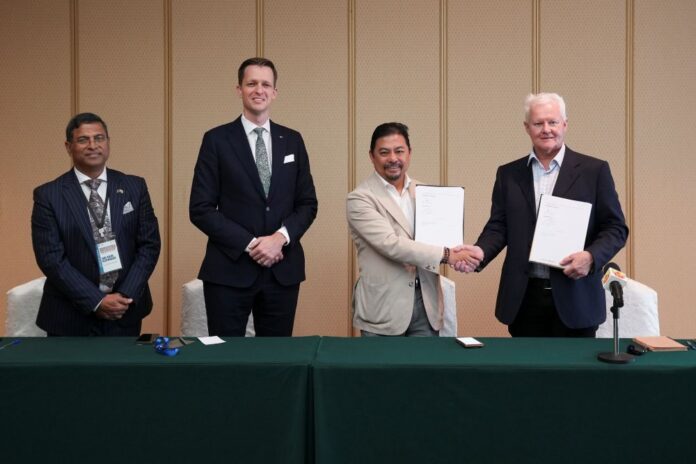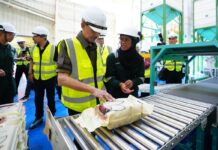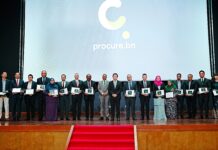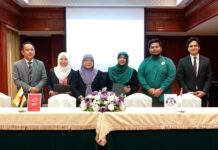
Australia’s AgriGen has signed an agreement with Brunei-based FarmFresh Industries to establish Brunei’s first private food testing laboratory.
The Brunei Integrated Analytical Laboratory (BIAL) is planned to be set up in the coming months. By expanding testing options for the industry, the lab is positioned to become a key support service for Brunei’s food sector — one of the country’s five priority sectors for economic diversification.
The pioneering project is targeting to commence operations between the fourth quarter of 2025 and the first quarter of 2026, initially occupying two floors of an existing building in a phased expansion approach.
Once operational, BIAL is expected to offer faster turnaround times and a broader range of testing services, many of which are currently outsourced overseas or available only through government agencies and higher education institutions.
The Memorandum of Agreement (MoA) between AgriGen and FarmFresh to collaborate on the establishment of BIAL took place on July 1 at the Rizqun International Hotel, on the sidelines of the Brunei Business Conference 2025.
What testing will BIAL offer?
In its press statement, BIAL said it aims to become an ISO-certified centre of excellence for real-time Polymerase Chain Reaction (RT-PCR) testing in the region.
RT-PCR is a highly sensitive, DNA-based method used to detect and measure the presence of specific organisms, such as viruses, bacteria, or to confirm the species identity of an ingredient. It plays a key role in halal verification, traceability, and meeting export standards.
BIAL will also specialise in the manufacture and development of reagents — the chemical substances used to trigger reactions in lab tests. Producing these locally will help avoid supply disruptions and support future research and commercial opportunities.
BIAL’s core testing capabilities will span four main areas:
Microbiological testing
Checks for harmful bacteria like E. coli, Salmonella, Listeria, Vibrio, and overall bacteria levels in food. These tests help ensure food is safe to eat and free from contamination — commonly used for seafood, raw meat, and ready-to-eat products.
Chemistry testing
Analyses food and water for trace metals and other chemical components to ensure products meet safety and quality standards. Applicable to raw ingredients, processed foods, and water used in food production.
Residue and contaminant testing
Detects the presence of pesticides, antibiotics, and allergens in food products to ensure compliance with safety regulations. Important for farms, processors, and manufacturers producing for both local and international markets.
Molecular biology testing
Uses DNA-based methods such as PCR to detect viruses, confirm species identity, and identify genetically modified organisms (GMOs). Supports halal verification, traceability, and market-specific labelling and certification requirements.
Milestone Australian FDI to Brunei
AgriGen’s entry into Brunei marks the first Australian investment in the country under Australia’s Southeast Asia Economic Strategy to 2040 — a plan backed by the Australian government with AUD 2 billion to drive trade and investment across the region.
BIAL’s setup is also being facilitated by the Brunei Economic Development Board (BEDB), the country’s lead agency for FDI facilitation, as part of ongoing efforts to attract investment into Brunei’s priority sectors.
Australian High Commissioner to Brunei Michael Hoy, who witnessed the signing of the MoA, said the establishment of BIAL will help Brunei’s food sector meet its export ambitions.
“Australia provides high-quality food inputs that are processed here in Brunei (into products) that are sold to Brunei consumers, and are now increasingly sold to markets outside Brunei as well,” said Hoy.
“We’re really looking forward to seeing the lab up and running very soon, and more quality Brunei products hitting the shelves in Australia and across the region.”
Director of AgriGen Ross Brierty added that one of BIAL’s key advantages will be faster testing turnaround times and competitive pricing — giving Bruneian food producers greater certainty and control.
“In Australia, we can sometimes return results on the same day,” said Brierty. “If we can achieve that in Brunei, it’s a much better outcome; food producers will know quickly whether their products are safe to sell locally or export. With testing done locally, you’re also more likely to get accurate results. So there are a number of win-win situations.”
Brierty shared that the lab is expected to become a multi-million-dollar investment over time.
He explained that a single piece of specialised equipment — such as those used for pesticide residue testing — can cost up to $200,000, with around 10 similar machines potentially needed for other processes.
Director of FarmFresh and Australian Business Champion for Brunei, Dr. Nur Rahman, said BIAL’s GMO testing — not currently available in Brunei — is a requirement in several key export markets. The molecular testing capabilities also provide precision detection for halal requirements.
The project is expected to create around 40 jobs, with the joint venture targeting 70% local employment, opening up opportunities for Bruneian graduates in the related fields of biology, microbiology, chemistry, and halal science.










![[Video] Brunei make first shipment of local products to Singapore’s Mustafa Centre](https://www.bizbrunei.com/wp-content/uploads/2025/05/Youtube-Thumbnail_MustafaCentre-100x70.jpg)
